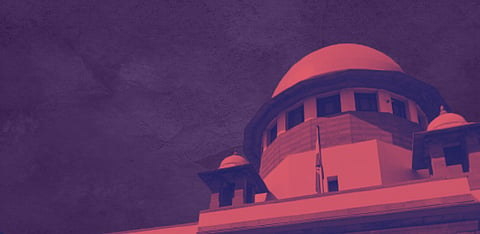

Ultimately, the Bench comprising Justices Hima Kohli and B.V. Nagarathna decided to take a lenient view of the matter and directed the constitution of a medical board by AIIMS to assess the medical condition of the petitioner.
—
ON Thursday, the Supreme Court chided a married woman for filing a petition under Article 32 of the Constitution, seeking to terminate her 24-week-old pregnancy, observing that it was not a case of forced pregnancy but a voluntary conception.
A Bench comprising Justices Hima Kohli and B.V. Nagarathna made these observations while hearing a petition filed by a mother of two children.
At the outset, the Bench admonished the petitioner for approaching the Supreme Court directly instead of knocking on the doors of the high court first. Justice Kohli noted that just because the petitioner was a resident of Delhi, she could not take the liberty of coming directly to the Supreme Court as a matter of convenience.
Justice Nagarathna remarked that if a litigant from Kerala or Karnataka had a similar prayer to make, it would be extremely difficult for them to come directly to the Supreme Court.
The advocate representing the woman sought to justify the petition by submitting that only the Supreme Court had the power, granted to it by Article 142 of the Constitution, to allow the termination of a pregnancy which is 24 weeks old.
Dismissing the argument, Justice Kohli said that the Supreme Court, in its decision X versus The Principal Secretary, Health and Family Welfare Department, has categorically laid down the guidelines on termination of pregnancy and that high courts also have the power to allow termination of pregnancy in exercise of their powers under Article 226 of the Constitution.
Returning to the merits of the case, the Bench observed that the conception was voluntary, and the parents have suddenly got cold feet. The Bench underlined its concern for the precious life of the unborn child.
The Bench added that there was a stark difference between a forced pregnancy resulting from an assault and a voluntary pregnancy.
The Bench sought to know about the physical and mental health of the petitioner. The advocate submitted that the petitioner was suffering from depression after her second delivery. This invited a sharp retort from the Bench observing that if that was the case, the petitioner ought to have been doubly conscious before getting pregnant again.
The advocate, for the petitioner, also made a submission that the petitioner came to know about her pregnancy belatedly. This left the Bench wondering how a married lady with two children did not realise that she had missed her periods for five months and could be pregnant.
Ultimately, the Bench decided to take a lenient view of the matter and directed the constitution of a medical board by All India Institute of Medical Sciences (AIIMS) to assess the medical condition of the petitioner.
It directed the woman to remain present before the medical board on October 6 and listed the matter for further consideration on October 9.